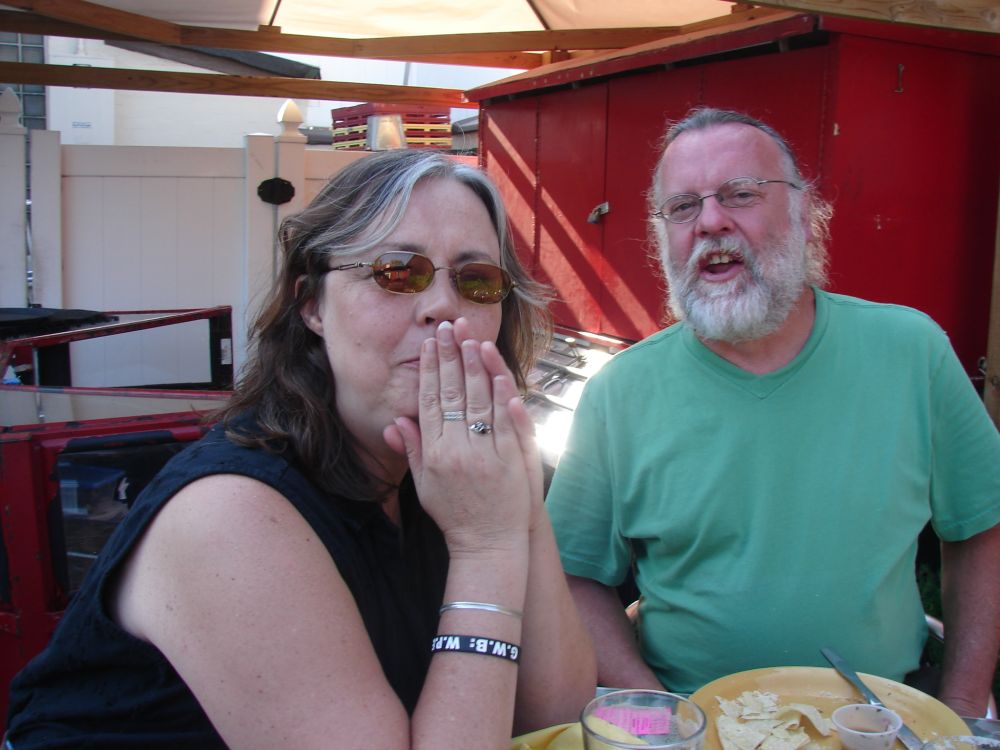Where Everybody Knows Your Name
February 6, 2022

What I miss most about restaurants started fifteen years before the pandemic. My husband and I were living on St. Louis’s South Side, and in cold weather, we walked to a cozy little restaurant called Langan’s every Friday evening. That fact alone would puzzle anyone who knows me well; I am hardly a creature of habit. My behavior when we arrived would drop their jaw farther: Every week, I ordered the same fish sandwich. Always with onion rings. And every week, the waiter made me something they had never heard of before my first visit: a hot toddy. With brandy, not whiskey.
None of this is like me. I will order wildly just for a chance to try something new (and yes, I have eaten crispy insects). I roll my eyes at people who are smug about ordering off-menu and having their whims catered to. But that is exactly what those Fridays represented: a chance to go someplace where we were known, our whims catered to.
We are not talking flown-in lobster here. Eating at Langan’s was just slightly more indulgent than eating in your mom’s kitchen. The place was inexpensive, plainly decorated, a neighborhood fixture rather than a destination. But that is what it taught me: the joy of becoming a fixture. Because just as a restaurant can be predictable, comfortable, and reliable, so can a human being. And to the extent that you are regular in your habits and willing to make your likes known, you are knowable by others.
Now I urge my single friends to become a fixture someplace. Walk in the park at the same time every Saturday. Take your dog to the same dog park every Sunday. Haunt the same bookstore. Go to the same place for coffee and stay there a while (and not reading such a good book that you will look too engrossed to be approached). That old pickup line, “You come here often?” You should.
This advice is ludicrous coming from me; other than those years we went to Langan’s, I have rarely followed it. But since the pandemic, I have made several friends just by going to the park at roughly the same times every week, and I have begun to see that my erratic, dragonfly approach, so hungry for variety that I refused to be pinned down, might not be as conducive to relationship.
Routine works for writing, too, and no doubt for anything creative or challenging. Stephen King’s muse is not some ethereal creature who comes “flitting down into your writing room and scatters creative fairy-dust all over your typewriter.” He describes a far more mundane muse, “a basement guy” who “sits and smokes cigars and admires his bowling trophies” while King does all the work. The basement guy is stubborn, tough to please. But he will keep you company, King promises, because you are sitting down at the same time every day and doing your part, and in time you will discover that “the guy with the cigar and the little wings has got a bag of magic.”
You just have to show up.
The value of that escaped me until now, probably because my mom took such joy in orderly routine that I was bound to hate it. I craved adventure and forgot it can find you anyplace. When I gave up on a researcher job at a glamorous international architecture firm and took a cozy gig at my alma mater instead, I wound up in Spain, traveling and writing about the experience. When I finally got fed up with the hodgepodge of exotically interesting men who never seemed to work out and let a classmate fix me up on a blind date with somebody a lot like me, we were engaged five months later.
Novelty and variety and surprise are all wonderful, but sometimes—whether you want to admit it or not—you need to risk being known through the familiar.
Besides, there is something lovely about walking into a public place and being hailed by name. That welcome turns a room full of strangers into a second home, a legitimate refuge. Maybe that is the deep psychosocial meaning beneath the phrase, “I’ll be taking care of you tonight.” A gracious servitude is involved in making someone else comfortable and satisfied by learning their preferences. I do our cooking—I married a can-opener—and in the feral state of pandemic solitude, we often eat dinner on trays in front of a grim news broadcast. Carrying that laden tray to him, I feel quite waitressy (which, depending on my mood, is either fun or annoying). The tray has been prepared and arranged according to his tastes, just as that hot toddy was made to order for me with brandy and fresh lemon and just enough honey and a clove.
Andrew is so damned polite and grateful, it took me years to extract his honest preferences. Did he like tomatoes in his salad? Anything is fine, sweetheart. But do you like them? Ten years later, the truth emerged: yes, but only when they are chopped small.
Courtesy is soothing; also, it is fun to be surprising, keep the world on its toes. But sometimes you have to slow down, open up, and let yourself be known, be predictable. Only then can the rest of us recognize you, greet you, realize what we have in common.
“Go and do something you love every day in a way that lets people find you,” I tell a shy, self-conscious friend who has been widowed for years and is thoroughly sick of eharmony.
It is such an easy way to be known, simply by being yourself.
Read more by Jeannette Cooperman here.







